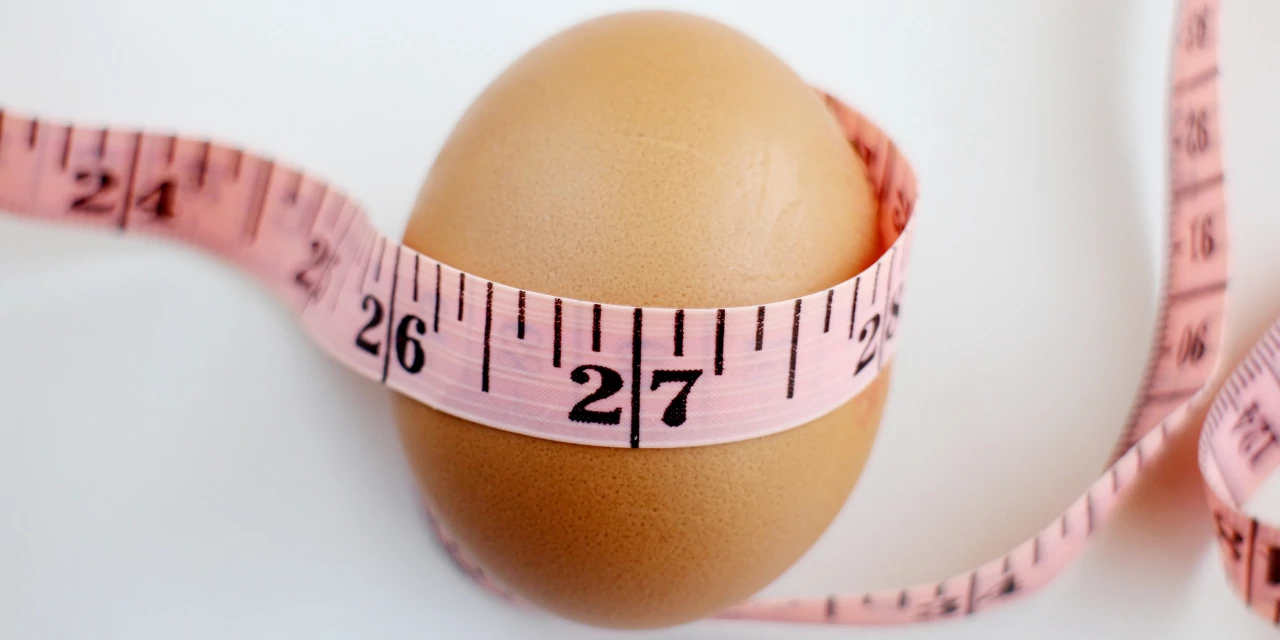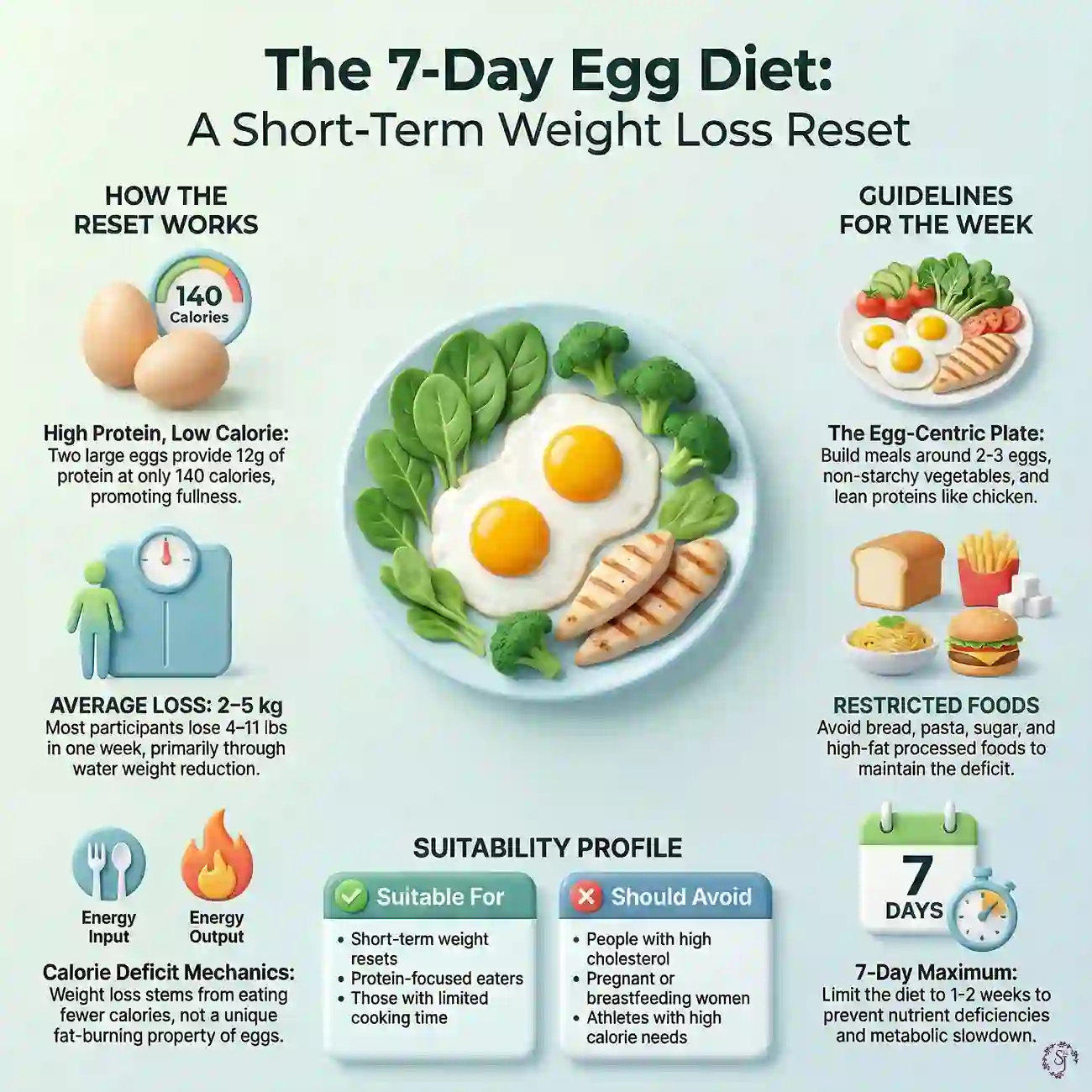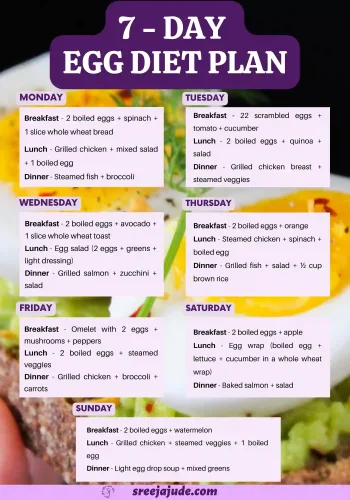
A 7 Day Egg Diet Plan for Weight Loss: What You Need to Know
Eggs are one of the most versatile foods out there. They are quick to cook, affordable, and packed with protein. But beyond being a high-protein breakfast favorite, eggs are at the center of a trending short-term weight loss approach called the 7-day egg diet.
Maybe you have seen bold claims online about dropping pounds in just one week by eating mostly eggs. It sounds simple, but does it really work and is it safe? In this article, you will find out exactly what the egg diet is, how it works, its benefits and drawbacks, and what results you can realistically expect after seven days.
Since any diet works best when combined with balance and consistency, we’ll also touch on how pairing the egg diet with a healthy morning routine like staying hydrated, moving your body, and starting the day with mindful habits, can help you feel more energized and grounded during the week.
What is The 7 day Egg Diet and Does It Work?

This graphic provides a simple breakdown of how the plan is structured, including what to eat, what to avoid, and what results to expect. Reviewing it helps you understand whether this diet aligns with your goals and health needs before beginning.
At its core, the 7-day egg diet is a restrictive meal plan where eggs are eaten at most meals, often paired with vegetables, fruits, or lean proteins. Some versions are called the “boiled egg diet” because hard-boiled eggs are the main choice, but other forms allow scrambled, poached, or even egg-white-based meals.
The diet’s appeal comes from its simplicity. Eggs are:
- Low in calories: Two large eggs add up to about 140 calories.
- High in protein: The same two eggs provide around 12 grams of protein.
- Filling: Protein helps you stay satisfied longer, which may reduce snacking.
Because of this, eating more eggs naturally reduces your overall calorie intake without leaving you as hungry as a typical crash diet might.
But here is the truth. The egg diet does not “melt fat” on its own. The weight you lose comes from eating fewer calories, not from any special fat-burning property of eggs. Many people do see quick results, but much of the early weight loss is water and glycogen (your body’s stored carbs), not just fat.
There are also different versions of the egg diet.
- Strict versions: Limit you to mostly eggs and water.
- More flexible versions: Include vegetables, some fruit, and lean proteins like chicken or fish.
While the flexible approach is safer, every version of this diet is still short-term and restrictive. It may give you a jumpstart, but it is not designed for lasting results.
Benefits and Limits of an Egg-Forward Week
One reason the 7-day egg diet grabs attention is that it delivers quick, visible results. If you are looking to drop a few pounds before an event or simply want a short-term reset, the structure of this plan can help.
Potential benefits
- Rapid weight loss: Because the plan cuts calories sharply, many people see the scale move within just a few days.
- Protein boost: Eggs are packed with high-quality protein, which helps preserve muscle while you are losing weight.
- Simplicity: Unlike complex diets that involve tracking macros or buying specialty foods, the egg diet is straightforward and easy to follow.
- Satiety: The combination of protein and healthy fats in eggs helps you feel fuller for longer, making it easier to resist snacks.
Important limits
- Not nutritionally complete: Eggs are nutritious, but they cannot provide everything your body needs. The diet lacks fiber, vitamins, and minerals unless you add vegetables and fruits and nutrient-rich foods like sprouts.
- Difficult to maintain: Eating mostly eggs every day can get monotonous and may lead to cravings or overeating once the week ends.
- Short-term results: Most of the initial weight loss is water and glycogen. Without sustainable habits afterward, weight often comes back quickly.
- Cholesterol concerns: While dietary cholesterol affects people differently, eating large amounts of eggs may raise cholesterol levels in some individuals, especially those with pre-existing health issues.
In short, the 7-day egg diet can give you fast results, but it is not a balanced or sustainable solution on its own. It works best as a short-term plan, paired with healthier eating habits afterward if your goal is long-term weight control.
How Does the 7-Day Egg Diet Plan Work?
The 7-day egg diet is designed around a simple principle: lowering calorie intake while increasing protein. By relying heavily on eggs and pairing them with a limited set of foods like vegetables, lean proteins, or small amounts of fruit, you create a calorie deficit that leads to weight loss.
Here’s what’s happening behind the scenes:
- Calorie reduction: A boiled egg has roughly 70 calories. When most of your meals are built around eggs and non-starchy vegetables, your daily intake drops without you having to count every calorie.
- High protein, lower carbs: Eggs deliver about 6 grams of protein each. When eaten throughout the day, they help maintain lean muscle while the body turns to fat stores for energy.
- Feeling fuller longer: Protein and healthy fats in eggs slow down digestion, which helps reduce hunger pangs compared to carb-heavy meals.
- Water weight loss: In the first few days, you may notice rapid weight changes. Much of this is water, since reducing carbs lowers glycogen storage in the body.
Unlike balanced eating plans, the egg diet relies on strict rules and limited food variety. This structure is what makes it effective for quick, short-term weight loss, but also why it’s not intended for long-term use.
What Can You Eat on The 7-Day Egg Diet?
The 7-day egg diet isn’t about eating only eggs all day. While eggs are the central food, the plan allows a few carefully chosen items to balance nutrition and keep meals somewhat varied. The key is simplicity and portion control.
Here’s what typically makes up the diet:
- Eggs as the base: Usually boiled, poached, or scrambled without added butter or oil. Most versions suggest 2 to 3 eggs per meal.
- Lean proteins: Some variations include small portions of chicken, fish, or turkey for additional protein.
- Non-starchy vegetables: Broccoli, spinach, zucchini, cucumbers, and leafy greens are common. These add fiber, vitamins, and minerals without adding many calories.
- Low-sugar fruits: Citrus fruits like grapefruit or small servings of berries are sometimes included to provide vitamin C and antioxidants.
- Water and unsweetened drinks: Staying hydrated is essential. Black coffee and green tea may also be allowed since they are low in calories.
Foods to avoid during the egg diet generally include bread, pasta, rice, sugary snacks, and high-fat processed foods. These restrictions are what push the body toward fat-burning mode while keeping daily calories low.
While the rules are fairly strict, sticking to these core foods is what makes the diet effective in the short term.
Sample 7-day Egg Diet Plan
If you’re curious about how a week on this diet might look, here’s a simple example of how meals can be structured. Keep in mind that portion sizes matter, and the focus stays on eggs, lean protein, and vegetables.

Monday
- Breakfast: 2 boiled eggs + spinach + 1 slice whole wheat bread
- Lunch: Grilled chicken + mixed salad + 1 boiled egg
- Dinner: Steamed fish + broccoli
Tuesday
- Breakfast: 2 scrambled eggs + tomato + cucumber
- Lunch: 2 boiled eggs + quinoa + salad
- Dinner: Grilled chicken breast + steamed veggies
Wednesday
- Breakfast: 2 boiled eggs + avocado + 1 slice whole wheat toast
- Lunch: Egg salad (2 eggs + greens + light dressing)
- Dinner: Grilled salmon + zucchini + salad
Thursday
- Breakfast: 2 boiled eggs + orange
- Lunch: Steamed chicken + spinach + boiled egg
- Dinner: Grilled fish + salad + ½ cup brown rice
Friday
- Breakfast: Omelet with 2 eggs + mushrooms + peppers
- Lunch: 2 boiled eggs + steamed veggies
- Dinner: Grilled chicken + broccoli + carrots
Saturday
- Breakfast: 2 boiled eggs + apple
- Lunch: Egg wrap (boiled egg + lettuce + cucumber in a whole wheat wrap)
- Dinner: Baked salmon + salad
Sunday
- Breakfast: 2 boiled eggs + watermelon
- Lunch: Grilled chicken + steamed veggies + 1 boiled egg
- Dinner: Light egg drop soup + mixed greens
As the days progress, meals repeat in a rotating fashion. Eggs remain the star ingredient, while small amounts of lean meats, leafy greens, and low-sugar fruits are included for balance. Hydration is a constant theme throughout the week, with water and unsweetened tea encouraged at every stage.
This style of eating is intentionally repetitive. The limited food choices help cut calories without needing to track them closely, which is one reason people find it straightforward to follow for a short time.
Who Should Try (and Avoid) The 7-Day Egg Diet?
The 7-day egg diet may look simple, but it isn’t suited for everyone.
Suitable for
- Short-term dieters: People looking for a quick drop in weight before an event may find it useful, as the calorie restriction and high protein content can lead to rapid water and fat loss.
- Protein-focused eaters: Those who enjoy eggs and tolerate them well will find it easier to stick with.
- People with limited time: The plan is straightforward and doesn’t require complicated cooking.
Should avoid
- Individuals with high cholesterol or heart concerns: Eggs are rich in cholesterol, and though recent research shows dietary cholesterol isn’t as harmful as once thought, people with cardiovascular issues should be cautious.
- Pregnant or breastfeeding women: Nutrient restriction may not provide enough fuel for mother and child.
- Children, teenagers, and athletes: The diet may not meet the calorie and nutrient needs for growth or performance.
- Anyone with egg allergies or digestive sensitivities.
Key takeaway
This plan is not a lifestyle diet but a short-term, restrictive tool. It can work for some, but others may face risks or nutrient gaps. Consulting a doctor or nutritionist before starting is strongly advised.
How Much Weight Can You Lose On The 7-Day Egg Diet?
One of the biggest reasons people try the egg diet is for fast weight loss. But how much can you really expect to lose?
Average weight loss results
- Many people report losing 2 to 5 kg (4 to 11 lbs) in just one week.
- Results depend on factors like starting weight, activity level, and metabolism.
- Much of the early loss is water weight due to cutting carbs, but some fat loss also happens from the calorie restriction.
What influences your results?
- Portion sizes – Eating larger servings of chicken, fish, or bread may slow results.
- Activity level – Adding exercise can boost fat loss, while being sedentary may limit it.
- Water intake – Staying hydrated helps reduce bloating and supports fat metabolism.
- Body type – People with more weight to lose may see faster results than those closer to their ideal weight.
Important reality check
- Rapid weight loss isn’t always sustainable. After the diet, weight may return once you resume normal eating.
- To keep results, it’s best to transition into a balanced diet with lean protein, vegetables, and moderate carbs.
Tips for following the 7-day egg diet safely
If you decide to try the egg diet, it’s important to follow it in a way that minimizes risks and keeps your body healthy. Here are some tips:
Do’s
- Drink plenty of water – At least 2 to 3 liters per day to prevent dehydration.
- Add low-calorie veggies – Spinach, cucumbers, lettuce, and broccoli add fiber and vitamins.
- Choose lean protein – Stick to chicken breast, fish, or turkey to keep calories low.
- Use healthy seasonings – Herbs, lemon juice, and light spices instead of heavy sauces.
- Get enough sleep – Rest supports weight loss and prevents cravings.
Don’ts
- Avoid processed foods – No sugar, fried food, or junk snacks during the diet.
- Don’t skip meals – It may slow metabolism and cause fatigue.
- Don’t over-exercise – Light activity like walking 2 miles a day or yoga is fine, but avoid heavy workouts since calories are very restricted.
- Don’t continue long-term – This diet is only safe for 1 to 2 weeks maximum.
Pro tip
After the 7 days, transition to a balanced maintenance diet instead of going back to high-calorie meals right away. This helps prevent rebound weight gain.
Read More: 7-Day Meal Plan for Muscle Gain for Beginners
Conclusion
The 7-day egg diet is a highly restrictive eating plan that can lead to quick, short-term weight loss. Eggs provide protein, essential vitamins, and minerals, making them a filling food choice. However, the lack of balance, limited variety, and risk of nutrient deficiencies mean this approach is not a sustainable long-term solution.
If you choose to try it, do so with caution, prioritize overall health and safety, and avoid extending the diet beyond a week or two. For lasting results, it’s better to view the egg diet as a short “reset” rather than a permanent way of eating.
Sustainable weight management always comes down to healthy, balanced eating, regular physical activity, and long-term lifestyle habits. If you’re considering this diet, it may be wise to check with a healthcare professional or nutritionist to ensure it’s safe for your individual needs.
Frequently Asked Questions
Q: Will I lose weight if I eat only eggs for a week?
A: You may lose weight if you eat only eggs for a week due to reduced calories and high protein, but the 7 day egg diet plan for weight loss is highly restrictive and not sustainable long-term.
Q: Do eggs burn belly fat?
A: Eggs don’t directly burn belly fat, but including eggs in a calorie-controlled diet can support fat loss by boosting protein intake and reducing hunger.
Q: How many eggs per day is safe?
A: For most healthy adults, eating 1 to 2 eggs per day is considered safe, but consuming more during a 7 day egg diet plan for weight loss should be monitored for cholesterol and nutrient balance.
Q: Can eggs replace meat?
A: Eggs can replace meat as a protein source in many meals, but they provide less iron and vitamin B12 than red meat, so a balanced diet is still important.
Q: What are the results of the 10 day egg diet?
A: Results of the 10 day egg diet often include quick weight loss, but outcomes vary, and much of the weight may return once normal eating resumes.



